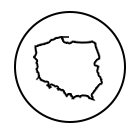Wiktoria Tomal and her children: Jan, Stanisława, Józefa
 Place
PlaceNieciecza
 People
PeopleTomal Wiktoria
Wiktoria Tomal (born in 1897) together with her children: Jan (born in 1926), Stanisława (born in 1928) and Józefa (born in 1931) lived in the village of Nieciecza near Żabno. One day, while being in the barn, she heard someone calling her name. When she went outside, she noticed Rachel and EliaszKohane standing in the shade, beneath the tree. Rachel asked her for help. Both mother and son were hungry and exhausted. Wiktoria conferred with Jan. She fed the guest and prepared a place to sleep for them.
Tomals knew Kohanes from before the war. Kohane dealt in trade at the time. Rachela and her husband had four children: Eliasz, Ryfka, Dawid and Sala. Eliasz and Jan were at the same age and went to school together. After the outbreak of the war, the fate of the Jewish family was tragic. They all got sent to the ghetto in Żabno, where terrible hunger was the only thing waiting for them. Rafka died because of it. Sala and Dawid were sent to the extermination camp in Bełżec, where all traces of them went missing. Eliasz was also supposed to be transported to one of the camps. He was loaded onto the train leading to either Oświęcim or Bęłżec – transports from Żabno went to both of them. When the train started, Eliasz jumped out of it. Rachela missed the transportation because that morning she sneaked out in search of the food. Elias knew that he would meet with his mother somewhere on the fields in Nieciecz – it was there that she went most often, and so it happened. They both decided to search for good people that would help them. That’s how they found Tomals’ farm.
Inside the barn, Jan nailed together some boards creating a hiding place for them, which he covered in tar and straw. Staying in one place was too dangerous so they often changed their hideouts. When it was warm, they hid near Dunajec in the bushes and brushes, and the Tomals brought them food. In winter they stayed at the barn or in the basement in Tomals’ house. At night they often came inside for a meal or to talk. Elias played cards with Jan.
One evening Rachela left her hiding place in the barn and went to the nearby field. She wanted to take a look from afar at her old home. Little did she know, that someone noticed her and began to tail her. Woman decided to get some fresh air and stretch her legs, so she went for a walk. When she reached the path leading to the three lonely houses, the observer withdrew, as he didn’t want to get noticed. The man reported to the police that he saw a Jewish woman in the neighbourhood. The next day. People were called to search the surrounding farms. Jan Tomala was one of them. Governor of the village spoke fluently in German. He told the soldiers that there was no point in searching at the Tomals, because the only thing they have is straw and that they certainly aren’t sheltering any Jews. Chief, together with Jan, drew their attention away from the farm and went in the direction of the three houses. Jan thoroughly searched for the fugitives, knowing that he wouldn’t find them there. People thought that the Jews must have gotten under his skin at some point, since he was so thorough in his search for them.
Maria Witkowska (maiden name Nowak) recalls: “ Well that was very dangerous. For something like this, the whole village could have been executed. […] that’s how it was back then”. During winter Rachela warmed herself up at Maria’s parents’ home.
The Kohane family managed to be saved. After the German occupation ended, both Rachela and Eliasz returned to their old house. Eliasz married Dora, a Jewess, that managed to survive in thenearby village. Married couple settled down in Tarnów. It was there that their children were born. After several years they emigrated to the United States.
Daughter of Eliasz and Dora, Bela Chopp, after years – in her letter to Józefy, the only one left of Tomal family – expressed her appreciation: “ On behalf of my family, I would like to express our deepest gratitude to you and your whole family, for your heroism, which saved the lives of my father and grandmother, who, without your help, would have inevitably died at the hands of the Nazis. In that dark time of war, when only few had decided to offer their helping hand, when others did nothing, and some actively participated in the extermination of Jews. It was your family that made a decision, for which they have to pay with their lives if your actions were ever found out by others. Rarely can one come across such acts of true altruism, humanity and courage – courage of such magnitude. Our family will be forever grateful to you. In fact our family would not have existed if not for the deeds of your family”.
Bibliography:
- FLV, List od Stanisława Prażucha (List Beli Kohane-Chopp z 12.09.2013 r.), Zabrze, 02.02.2014 r.
- FLV, Nagranie audio, sygn. 405_1527, relacja Marii Witkowskiej, Nieciecza, 01.10.2013 r.
- FLV, Nagranie video, relacja Józefy Tomal, Beli Chopp, Stanisława Prażucha, Nieciecza, 02.07.2016 r.
- FLV, Nagranie video, relacja Józefy Tomal, Beli Chopp i Marii Witkowskiej, Nieciecza, 25.06.2016 r.
DOCUMENTS:
No extra materials